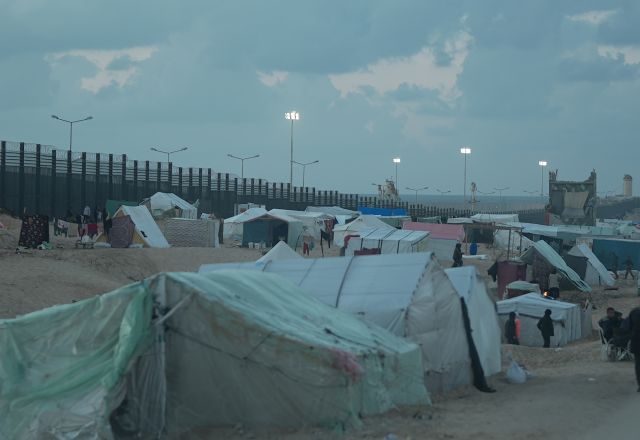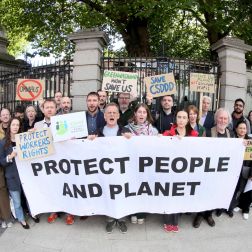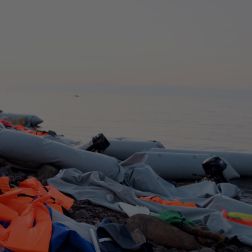
- 6 mins read time
- Published: 28th May 2024
European Parliament's Role in Shaping Migration and Asylum Policies: A Call to Action for Ireland's MEPs
The European Parliament has historically played an important role in shaping the EU’s migration and asylum polices. Even though the Parliament has had less say in recent years, Ireland’s MEPs will play a part in of deciding EU laws in this field and will have opportunities to uphold the rule of law and human rights in our union and at our borders, for citizens as well as for people who have moved here.
Oxfam’s proposals on migration and asylum cannot be read as standalone, but together with our manifesto’s proposals on inequality, climate change and development cooperation and humanitarian aid. Each of these issues are linked – when the Irish government fails to invest in public services and housing, it creates problems for all of us and especially for the most vulnerable in our society. Oxfam calls on MEP candidates to take action for equality and fair generation of investment in public services to address all these issues and to help us achieve the aims and potential of the EU project.
The EU’s five richest billionaires have increased their wealth by 76 percent since 2020, from 244 billion euro to 429 billion. That sees their wealth growing at a rate of 5.7 million euros per hour. At the same time, 99 percent of the EU’s population has become poorer. Oxfam has estimated that a progressive wealth tax of up to 5% on the EU’s multi-millionaires and billionaires could collect 286.5 billion euros annually.
Oxfam and our tens of thousands of supporters in Ireland promote equality, including economic equality and the rights of migrants, including refugees now, during this election campaign, as much as ever. Human rights and international law are not something we support only when it’s easy, but also in more challenging times.
At our EU borders, people who have fled their homes to ask for protection in the EU are too often pushed back violently and denied this right (as documented by Oxfam’s partners). The humanitarians, lawyers and members of the community who try to uphold basic humanity, or document these abuses are criminalised in several EU member states.
- Monitoring the implementation of the EU’s Asylum and Migration Pact to ensure that fundamental rights, the rule of law and the right to asylum are upheld at European land and sea borders and within Member States. Most notably, the Parliament should push for an effective and mandatory solidarity mechanism prioritising relocation.
- Pushing for the rapid establishment of independent border monitoring mechanisms at the EU’s land and sea borders, in line with recommendations from civil society regarding their independence and functioning, and based on lessons learned from the (so far inadequate) mechanisms established in Greece and Croatia.
- Monitor the Commission’s role as Guardian of the Treaties and hold it accountable when it fails to launch disciplinary action such as infringement proceedings against Member States who systematically breach EU asylum law.
The EU is co-funding and co-managing prison-like centers at the EU’s external borders that subject refugees and migrants to detention-like conditions (even though they are not accused of any crime) and truncated ‘border procedures’ with inadequate safeguards and due process guarantees. This risks denying people the right to fairly ask for protection with the necessary legal supports to do so and therefore increases the risk of sending people back to a place where they are in grave danger (refoulement).
- Pushing the European Commission and relevant agencies to focus their efforts on upholding the right to asylum in the EU, increasing reception and asylum processing capacity on EU territory and increasing safe and regular pathways to Europe.
Even though 75% of the world’s refugees are hosted in low- and middle-income countries, the EU has been using its power (and money) to get non-EU countries to take on EU migration policy, for instance by hosting asylum seekers or by stopping people from moving towards the EU borders.
Despite promises to comply with international law and EU principles and values, and to protect fundamental rights, we have seen the EU strike dysfunctional and non-transparent migration deals with neighbouring countries to outsource its responsibilities, diverting scarce development funds to pay the bill. This takes various forms, from dysfunctional migration deals with non-EU countries (e.g. EU-Turkey Agreement), to funding and training foreign security forces and violent border control (Libya), to attempts to introduce migration and readmission cooperation conditionality into trade relations with developing countries (Generalised Scheme of Preferences) and visa policies.
The EU needs to ensure that aid is used to end poverty in the Global South and to boost partner countries’ economies - not to end migration and boost borders.
- Strengthening European Parliament’s monitoring of migration-related spending (e.g. AMIF, NDICI), across relevant Committees (e.g. LIBE, CONT, BUDG, DEVE) and request the suspension of funding to Member States as well as relevant agencies (FRONTEX, EUAA) involved or complicit in breaches of EU asylum acquis or fundamental rights, including in third countries.
- Demanding equal access to and increased scrutiny over the selection and implementation of activities funded under the NDICI 10% migration component. Currently, the Council is given a far higher degree of scrutiny under the new informal coordination mechanism group, while the implementation and governance of migration-related spending under the NDICI remains highly untransparent to the public and civil society. Particular attention should be paid to the mandatory mid-term review and compliance with ODA guidelines, to ensure that migration-related spending under the NDICI is in line with the instrument’s stated aim and international aid rules.
- Challenging the conclusion of untransparent migration ‘agreements’ with non-EU countries and attempts to externalize the EU’s border management, reception, asylum processing and protection responsibilities to non-EU countries.




